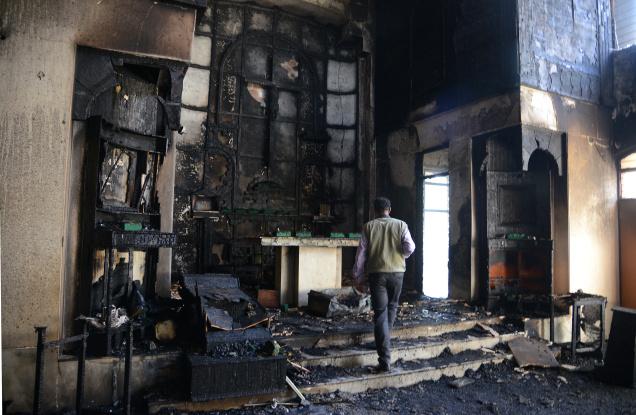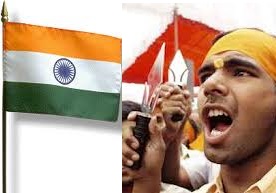 There has recently been a lot of anxiety amongst
the Christian communities in India owing to the desecrations and violence
targeting Christian churches especially in the city of Delhi. There have been
five attacks on churches in the capital of India since December 2014, the
latest being the
vandalization of the Church, and desecration of the Blessed Sacrament in the
church of St. Alphonsa in Vasant Kunj earlier this week.
There has recently been a lot of anxiety amongst
the Christian communities in India owing to the desecrations and violence
targeting Christian churches especially in the city of Delhi. There have been
five attacks on churches in the capital of India since December 2014, the
latest being the
vandalization of the Church, and desecration of the Blessed Sacrament in the
church of St. Alphonsa in Vasant Kunj earlier this week. In the face of earlier attacks on churches the focus of Christian leaders turned towards the Prime Minister. These leaders report that the Prime Minister did not say anything that would reassure them. What makes it worse is that Prime Minister Modi has chosen to keep absolutely mum over these incidents. Public silence in this case can only be interpreted as his unwillingness to restrain the Hindu Right and make sure that law and order is maintained. This silence is not surprising however. We need only think back to his role in the pogrom in Gujarat in 2002. It took days for the State machinery to get things under control, and significantly Modi has been held responsible for allowing the violence to continue. Old habits, it appears, die hard.
I doubt that this tendency towards silence played on the mind of a member of a prominent Catholic business family when he suggested in conversation with me that Modi was a good administrator and “should be given a chance.” It is the limited perspectives of the elites of the community that one should also mourn. That this individual did not see managing genocidal violence as part of good administration says a lot about the milieu in which he moves.

What is worse is the fact of complicity of the state in fueling the acts of violence. A number of the victims in Gujarat indicated that the police refused to help them, claiming that they did not have orders to do so. Further, the police failed to place leaders of the violence under preventive detention. In the case of the violence against Christians, this chilling pattern is re-emerging. There has been news of visas being deliberately withheld from Catholic Bishops who were to visit from the Vatican to attend a liturgical conference organized by the CCBI (Conference of Catholic Bishops of India). More recently, persons peacefully protesting the violence against Christians and the lack of state action were set upon by the police, beaten and dragged into police custody.
These events are in fact very much in keeping, not only with the history of Modi, the BJP, but also the supposedly secular Indian nation-state. The hostility of the Indian state to the minorities of India, is a matter of record. In fact, in a scenario resembling the recent denial of visas to visiting Bishops, soon after India achieved Independence the Indian state took an aggressive stand against Christian missionaries of foreign nationality in India. That issues did not escalate, as seems to be the case now, is largely because the Indian and Hindu nationalism of the time was more focused on destruction of the Muslim communities in India. Christians were, at the time, seen as “harmless”.
While the Muslims in India were being harassed and butchered across the country the Christian communities in India were by and large silent. On the contrary, these Christian groups in India played along with the logic that it was “the Muslims” who were to blame, rather than Hindu nationalists. Indeed, even in the face of these attacks, some Christian leaders are still shortsighted enough to suggest ‘“We are peace-loving people. If it had been another community, Muslims, khoon kharaba ho jaata” (Blood would have been shed)’
These Christians failed to see that the problem is not Muslims, but in fact Indian nationalism itself. They fail to see that playing the ‘good’ minority, as opposed to the allegedly troublesome Muslim minority, is not going to help. Rather, it plays straight into the hands of the cussed nationalisms in India. In fact, one could argue that playing into the hands of Indian/ Hindu nationalism has been a part of the agenda of the Catholic Church in India. Whether it was the foreign missionaries at the time immediately prior to Indian independence, or the largely upper-caste hierarchy of the Catholic Church subsequently, working towards creating good Indians has been a part of the Indian Catholic programme. This has been done in a variety of ways, either through the misguided policy of inculturation, which sought to make Catholicism in India more 'Indian', i.e. upper-caste Hindu-like, or by urging a strong sense of patriotism, which normally translates to an unblinking acceptance of nationalist rhetoric. This irrationality has ensured that we swallowed the Indian nationalist narrative, saw the Indian Muslim as the trouble-maker and tried to place as much distance between them and ourselves.
There is little distinction between Indian nationalism and Hindu nationalism. The difference is largely a matter of degree, since both are built on the idea of the upper-caste Hindu as the de facto Indian. Contrary to the spiel that we have been fed since the beginning of the Indian nation-state, these nationalisms do not tolerate difference. The tolerance is merely cosmetic. When push comes to shove, as has happened in so many cases, the minority group is made to feel the pinch.
It was in light of this reality that for some
decades now the Christians in India were asked to mobilize along with Muslims
in India, and see the latter groups as allies rather than enemies. There was, unfortunately, no real interest
demonstrated by Christian groups. I can recall efforts in Goa that attempted to
involve the hierarchy and the laity of the Catholic Church. Where the hierarchy
was interested, the laity were not. The hierarchy too, had its own reservations
as to how far they would, or could, go. All too often, and not just in Goa, the
interest lies in engaging in superficial ‘inter-religious dialogue’, rather
than lending shoulders to political battles. A significant political battle
that we in Goa could lend support to is the need that the Sunni Muslim
communities in Margão have for a burial ground. The existing burial ground is
too small for the existing population and all efforts to secure a larger ground
have met with resistance, largely from Hindu nationalist groups, but often
supported by Catholic bigots.
Too often, Christians in Goa are so in the thrall
of racist stereotypes about Islam and Muslims that we fail to see the diversity
that exists within these groups. Despite the complex history of Islam within
coastal south India, of which Goa is part, Islam itself is written off as a
violent religion. Additionally, we are blinded by the nativist logics that see
Goans as either Hindu or Catholic. Muslims have no space in this vision of Goa
even though Islam has had a long presence in the territories that are today
Goa, and many Catholics in Goa would have had Muslim ancestors. The reason we
are blinded to these histories and realities is that Goan histories have been
written almost exclusively by persons from upper caste backgrounds who want to
privilege their putative Hindu pasts. They wish to embellish their pasts as
Hindu, largely because they have long seen the writing on the wall, India works
best if you are upper-caste Hindu. Indeed, as
I illustrated elsewhere, it is the caste bias among Catholics in India that
has ensured that the superficial inter-religious dialogues that take place are
often biased in favour of Hinduism, rather than Islam.
Making alliances with Muslims does not
necessarily mean working with all kinds of Muslim organizations. It would first
require us to first embrace Muslims and their worlds, get to know them and
understand them better. It is only after having effected this embrace that we
can become alive to the diversities and differences among them. It would mean
learning to identify those Muslim organizations that are no different from the
RSS and working with those organizations that are open to democratic ways
of social organization.
In the final analysis it may perhaps be the lack
of internal democracy within the Catholic Church in Goa that stands in the way
of effecting solidarity with Muslims groups. There is no doubt that the Catholic
Church in Goa is appallingly lethargic and I would like to suggest that the
reason lies in the manner in which it is organized and the manner in which
internal dissent is dealt with. A group that is itself compromised, and comes
out against Hindutva only when its direct interests are pinched is hardly going
to be able to provide leadership to other beleaguered communities, or even
associate meaningfully with them. It appears that our many years of lethargy is
beginning to show and our pigeons are now coming home to roost. May God protect
us.
(A version of this post was first published in the O Heraldo on 6 Feb 2015)

_800X600_slider_main.jpg?1361943179)

No comments:
Post a Comment